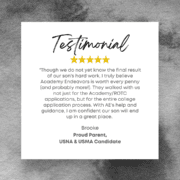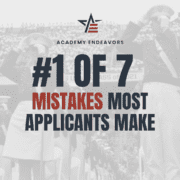How To Get A Congressional Nomination
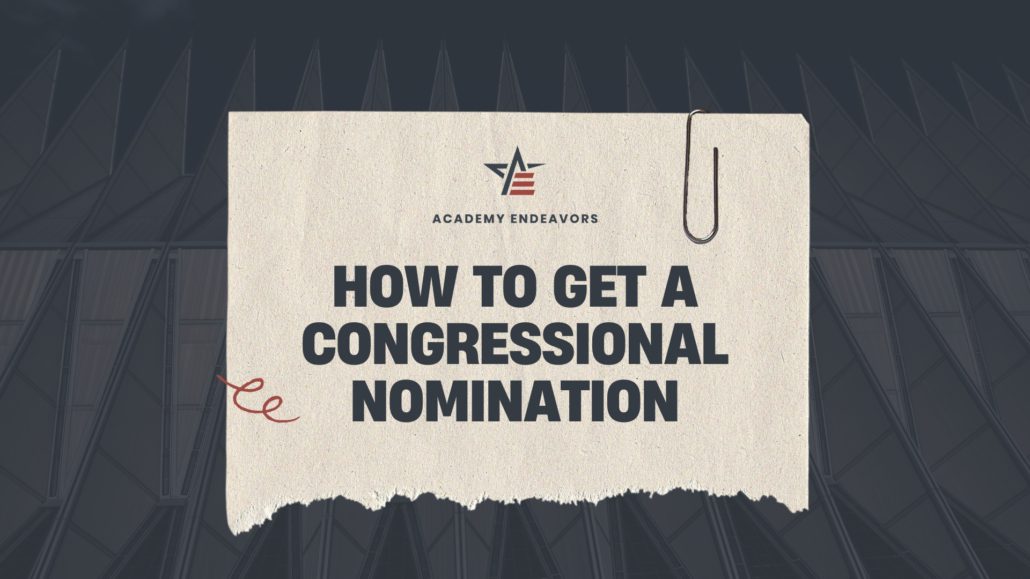
Earning a congressional nomination is one of the most challenging steps in your Service Academy journey.
With multiple nomination sources, strict deadlines, and intense competition, many don’t know where to start and can feel overwhelmed. But don’t worry—we’ve got you covered! This step-by-step guide will clarify the complex process, help you stay ahead of deadlines, and give you the best chance at securing your nomination—bringing you one step closer to your Academy appointment!
Let’s walk through each step together here below:
Winning a nomination requires a general understanding of the process. There are two key terms you need to know which are often confused:
- Nomination – A required step for an appointment. It’s an official recommendation from a member of Congress (or other nominating source) that allows you to be qualified for an appointment. You cannot receive an appointment without it
- Appointment – Your ultimate goal. This is the official offer to attend a Service Academy (synonymous with admission or acceptance)
The graphic below illustrates how a nomination is just one step toward your ultimate goal: a Service Academy appointment.

How Nominations Work
- Every candidate must receive at least one nomination for each Academy he/she applies to in order to be considered for an appointment
- except for the U.S. Coast Guard Academy, which does not require nominations
- Nominations are not blanket approvals, they are Academy specific. You must receive a nomination for each academy you apply to
- Ex. If you want to apply to West Point and the Naval Academy, you need a separate nomination for each
- There are multiple sources of nominations, including Congressional (most common), Vice Presidential, and Service-Connected (more on this in Step 3)
- Candidates can receive multiple nominations from different sources and to multiple academies
- Ex. A candidate could receive a nomination from her Senator to USAFA, and nominations from her U.S. Representative to USAFA and USNA. She is now eligible to apply to both USAFA and USNA
Begin with the end in mind! The nomination process is highly time-sensitive and runs alongside your Academy application. The earlier you start, the better your chances of securing a nomination.
Recommendation: Aim to submit all nomination applications by August 31st of your senior year, even if official deadlines vary. This ensures you stay ahead and avoid last-minute stress.
To help you stay on track, we’ve included two detailed timelines:
- Nomination-Specific Timeline – A step-by-step breakdown of key nomination dates and tasks
- Overall Academy Application & Nomination Timeline – A broader view of how your nomination process aligns with your overall Academy application
By following these timelines, you’ll be able to stay organized, proactive, and fully prepared for your nomination application.
Nomination Specific Timeline
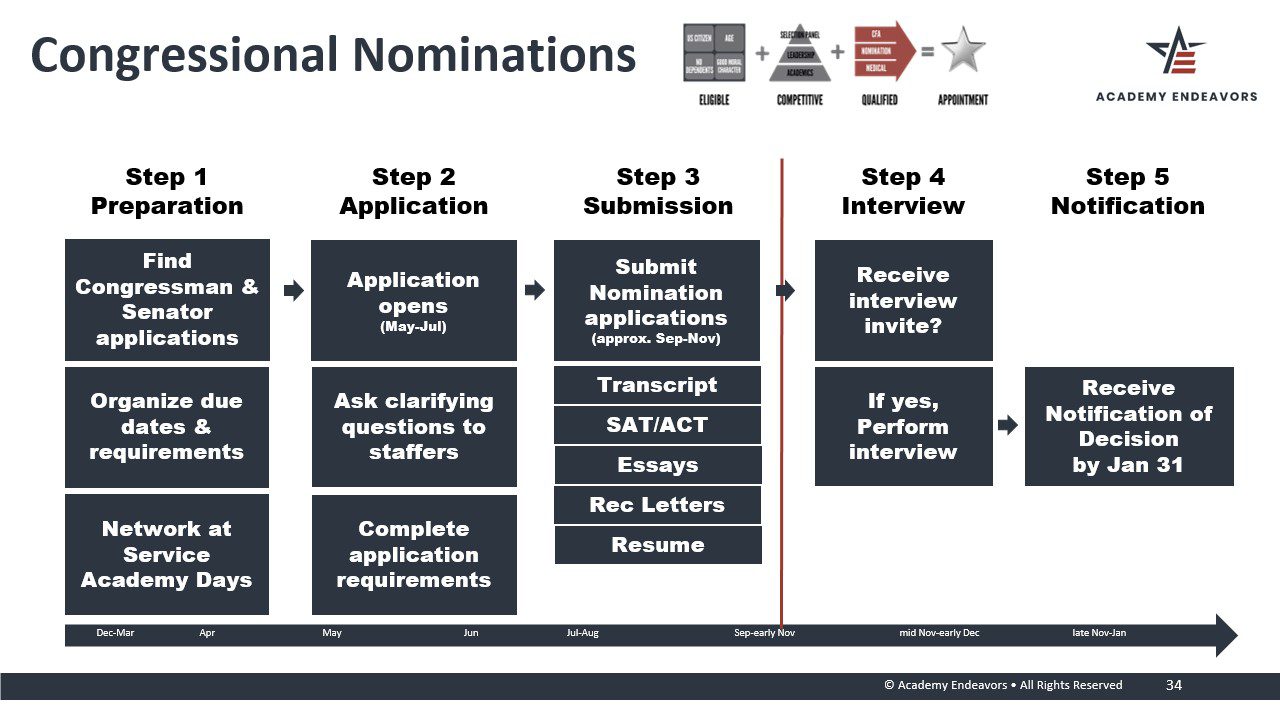
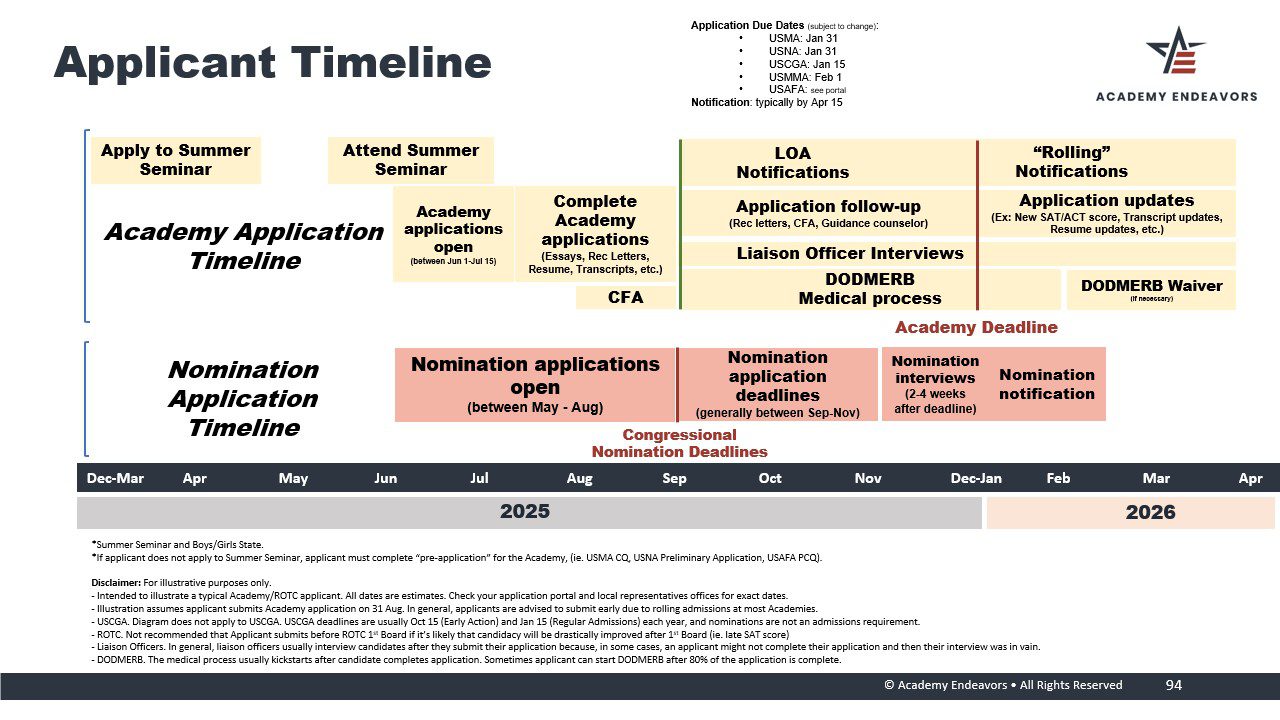
There are multiple sources for nominations, and you should apply for every nomination you are eligible for. The most common type is the Congressional Nomination, but there are other paths depending on your background.
Below, we list the different nominating sources, and a look at their competitiveness and commonality.
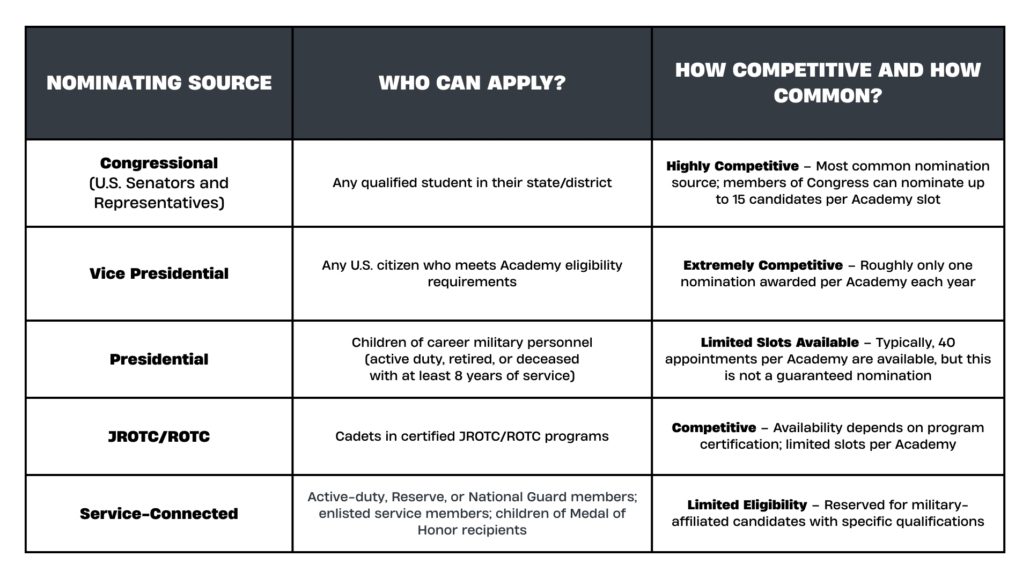
Here’s what an average class may look like in terms of where they received their nomination. Note that most come from the Congressional route, thus we speak most broadly and exclusively about that path in this post.
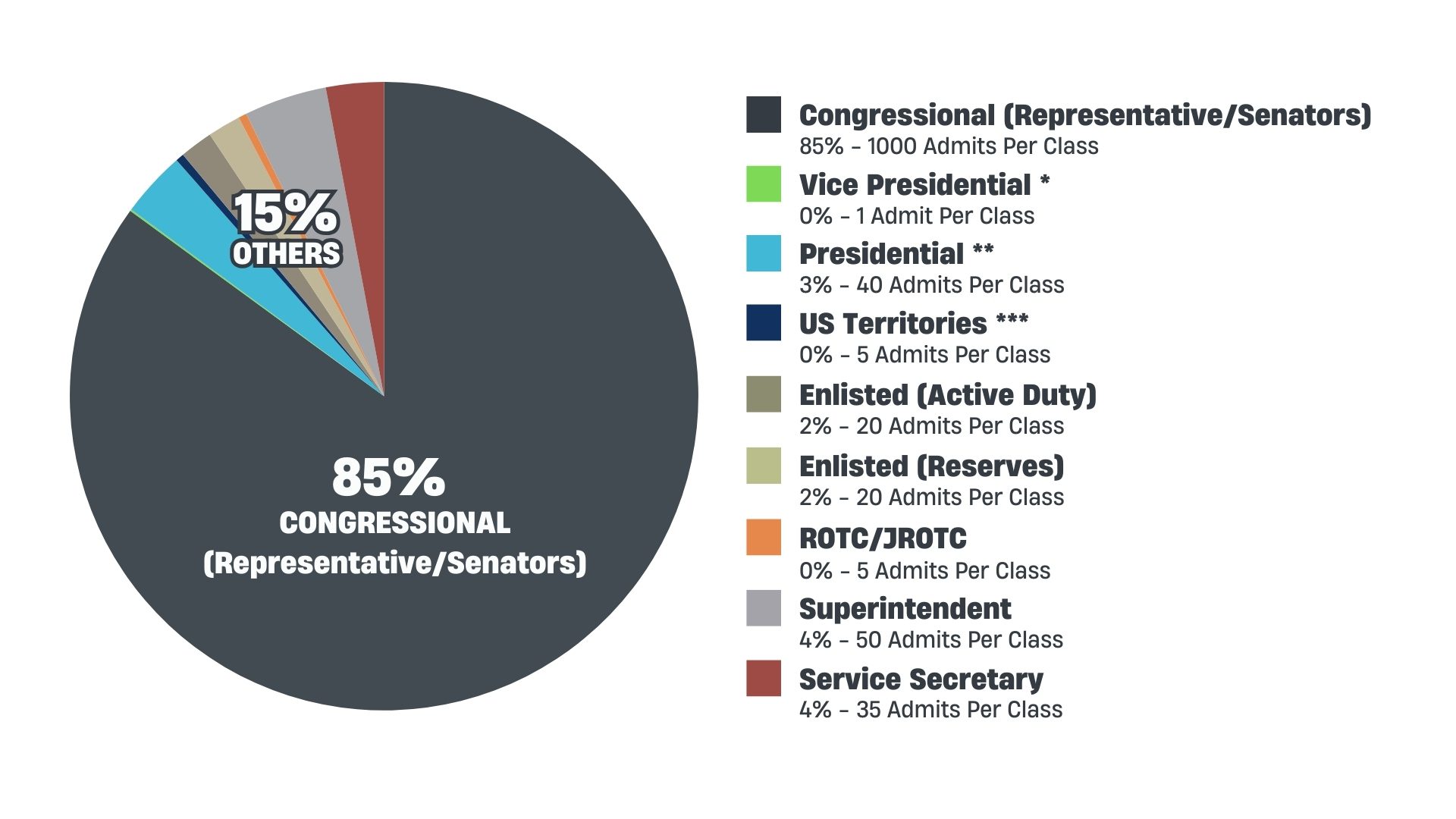
Required Knowledge About Congressional Nominations
To better understand the Congressional nomination process, here are key facts that will impact your strategy:
- Each member of Congress can have up to 5 cadets/midshipmen at each Academy at a time
- That means most members have ~1 vacancy per Academy each year, but this can vary. Some years, there may be multiple openings, and no openings in others
- For each vacancy, a member of Congress can nominate up to 15 candidates
- You want to be one of those 15!
Maximize Your Chances
- Since nominations are highly competitive, you should apply to your U.S. Representative and both of your U.S. Senators and the Vice President.
- We estimate the likelihood of receiving a nomination to the Academy you apply to is roughly 30%
- However, competition will vary greatly by district
- The most competitive districts will be those with a higher military presence (San Antonio, TX, Northern Virginia, San Diego, CA etc.) or in a high socioeconomic area
- Need help finding your U.S. Senator or Representative? Check out these links:
- Applying to the U.S. Merchant Marine Academy (USMMA)?
- Unlike other Service Academies, where you can only apply for a Congressional nomination from your district’s U.S. Representative, USMMA candidates can apply for a nomination from any Congressional district in their state.
Congressional Nomination Methods
Members of Congress use two primary nomination methods
- Competitive Method (Used by ~98% of offices)
- You are one of 15 nominees for a given vacancy
- The Service Academy, not the nominator, makes the final selection for appointment
- Principal Nomination (Rare, but highly valuable)
- The Congressional office ranks a single candidate as the “Principal Nominee”
- If you receive this type of nomination, and meet Academy requirements, you are guaranteed an appointment
Most Congressional offices do not publicly disclose which method they use. Be sure to ask before your interview, as receiving a Principal Nomination would dramatically improve your chances
Want to learn more? → Read About Principal Nominations Here!
Now that you know who could potentially nominate you, it’s your responsibility to get organized with the due dates and requirements for each, as they will likely vary by nominating source.
We recommend building a spreadsheet to keep track of important dates and requirements.
Be sure to look for the following:
- Deadlines: What are the deadlines for each application?
- Remember our goal is to have all applications complete by August 31st of senior year regardless of due dates
- Service Academy Network Days: Does the nominating source have a Service Academy Network Day or info session? If so, plan to attend where you can make a great first impression and clarify any questions you might have
- Requirements: What are the requirements for each application? In general, expect the following:
- Eligibility (similar to the Academy’s criteria)
- 17-23 years of age
- U.S. citizen
- No dependents
- Good moral character
- Academic & Application Materials
- Transcripts
- Test Scores
- Essays
- Resume
- Letters of Recommendation
- Eligibility (similar to the Academy’s criteria)
Head to step 5 for guidance on how to craft a strong application!
This is a critically important step in the process and significant time and effort should be dedicated to crafting quality applications to submit. Here are some tips for each piece.
Choosing your Recommenders
Selecting the right recommenders is crucial. Most applications require three letters of recommendation from individuals who can speak to your leadership, character, and academic ability.
Avoid generic letters. Choose people who can write detailed, personalized recommendations about your strengths and potential to succeed at an Academy.
Who to ask?
- Teachers
- Coaches
- Community/Faith-Based Leaders
- Employers
Crafting Your Personal Statement/Essay
Building a strong personal essay is part of the foundation of your journey.
When writing your essay, you should approach it with the mindset of showing, not telling the panel on why you are enthusiastic about attending the Academy or Academies you are applying to with personal examples. You should also aim to be concise in your writing. Don’t write just to get to the word count. Being concise in your communication is doing the panel a favor and shows fit for being a strong candidate.
Put in the effort here that is required of a future Officer. Expect multiple drafts and revisions before you can clearly articulate your story.
Here’s a structure and outline you should be using to build your personal essay:
Personal Essay Structure
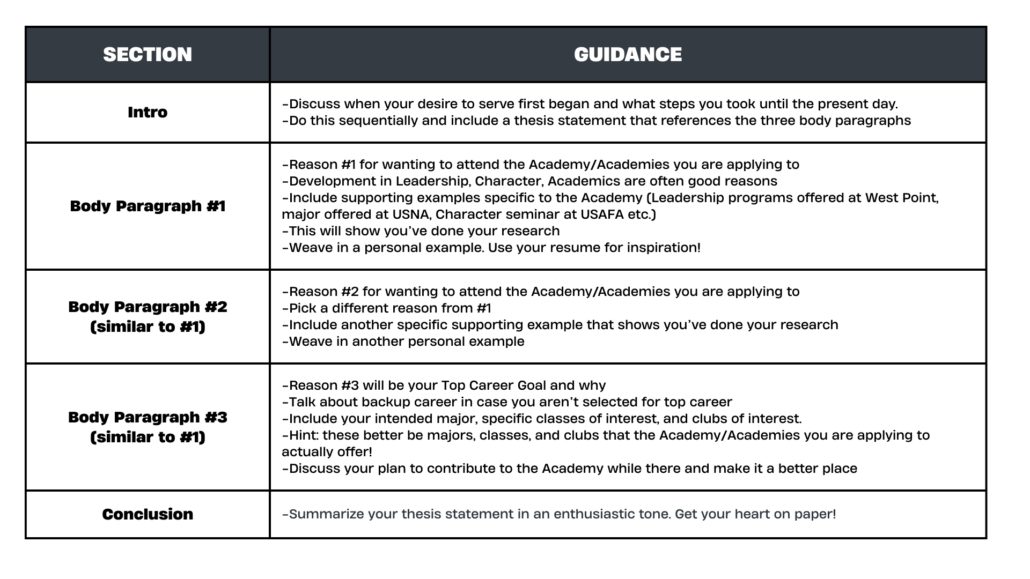
Grade your essay with our scorecard:
- Is it inclusive to all Academies you are applying to?
- Is it personal? Could it be copied onto another’s essay? If so, it needs work
- Is it specific? Could it be re-used for an ROTC/other college essay? If so, it needs work
- Is it passionate and enthusiastic?
- Are there crystal clear reasons for why you want to attend Academies?
- Do examples reveal fit qualities that Academies are looking for?
- Are there coherent career goals, intended major, and brief reasons why?
- Does it establish credible enthusiasm?
- Is your essay less than 500 words?
- Are you concise in your writing with no redundant language?
Building Your Resume
Your resume should highlight leadership, academics, athletics, and service
What to include:
- Academics: GPA, Test Scores, AP Courses
- Leadership Roles
- Athletics
- Community Service
- Employment
Use our Free Resume Template to build your resume
Rank Order Your Academy Preferences
Most Congressional applications require you to rank your academy choices. This decision is strategic and can impact your nomination chances. Remember, the goal is to secure at least one nomination to each Academy you apply to.
Key Considerations:
- Some members of Congress will only nominate you to your #1 choice
- Others allow nominations to multiple academies
Strategic Approach:
- Your U.S. Representative is often your best shot at a nomination—rank your true #1 Academy choice here
- For Senators, strategy varies. If you’re equally excited about USNA and USAFA, consider listing USNA as #1 on one Senator application and USAFA as #1 on another
- What NOT to do: If you’d love to attend either USNA or USMA, don’t list only USMA as your #1 on all three applications. It may limit your chances
Now that you’ve submitted your applications, you will wait to see if you have received an interview. The interview is not guaranteed given the fierce competition. Per our timeline, expect to receive notification for interviews in Nov to early Dec.
At Academy Endeavors we teach that interviews are the KEY to winning your nomination.
Why? In a pool of highly qualified candidates, many with similar or even stronger credentials, your interview is your chance to prove why you deserve the nomination.
Character can be difficult to assess on paper, and this is your opportunity to stand out!
Character can be difficult to assess on paper, and this is your opportunity to stand out!
Note that your evaluation begins the moment you first interact with the office staff over email and doesn’t end until after your interview. Every detail counts and first impressions matter.
Who Is Interviewing You?
You’ll likely interview with a volunteer panel of retired military officers, Service Academy graduates, and others familiar with military leadership, not the actual member of Congress or nominating source. These panelists play a critical role in deciding who gets the nomination, not the members of Congress themselves.
What They Look For
- Competitive Academic Profile: Panelists seek candidates who have a strong chance of being accepted to the Academy. They won’t waste a nomination on someone unlikely to be selected
- Character: Military officers need high moral character. This trait can’t be seen on paper, and the panel wants to assess you as a person in the interview
- Motivation to Serve: Your core motivation must be to serve as a military officer. If your commitment to service is unclear, the panel will easily see through this
- Leadership: Military officers must inspire and lead others. The panel will assess whether you’re someone future troops would want to follow
- Other Key Attributes
- Gratitude & Patriotism – Do you have a deep appreciation for your country?
- Selflessness – Are you truly willing to put others before yourself?
- Resilience – How do you handle adversity, setbacks, and failure?
- Communication Skills – Can you clearly and confidently express your thoughts?
- Analytical Thinking – The Academies are STEM schools. How well do you problem-solve and think critically?
- Achiever Mindset – Do you push yourself, seek challenges, and hold high standards?
- Self-Awareness – Can you reflect on your strengths and weaknesses?
- Empathy – Are you able to understand and support those around you?
- Diversity & Inclusion Awareness – Can you respect and lead people from all backgrounds?
Interview Structure and Questions
While each interview will certainly be different, expect it to last anywhere between 10-45 minutes and take on a variety of tones.
You should be prepared to answer all of the question types in the chart below. The best way to prepare is to practice, practice, and practice!
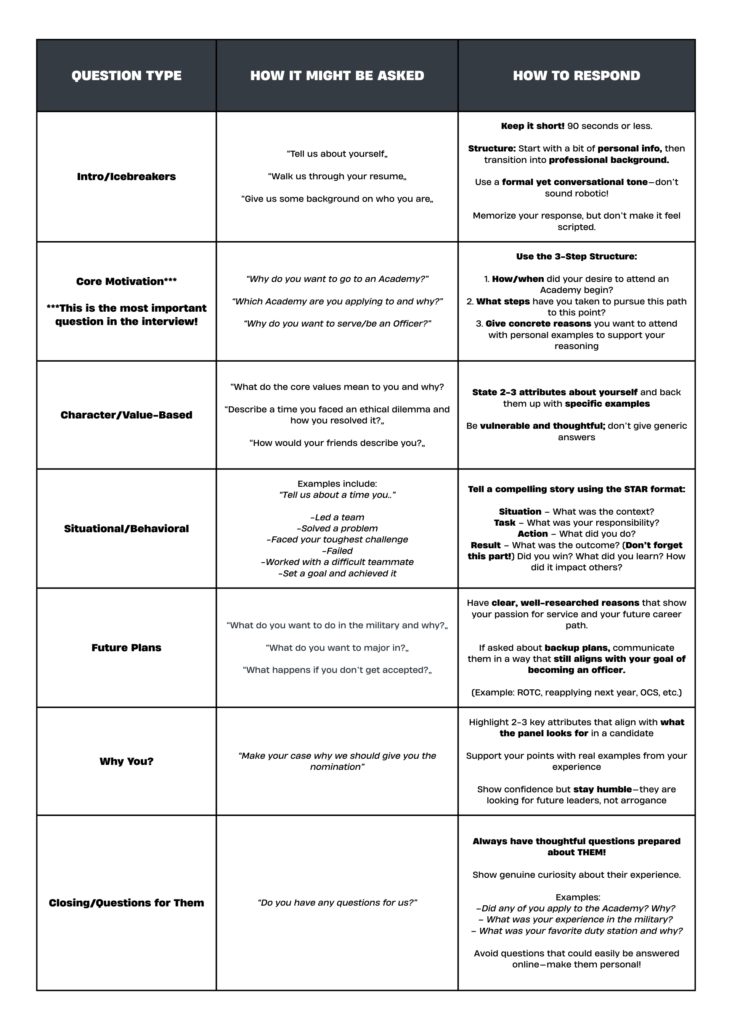
Win the Interview
The moment you step into the room, the panel is evaluating whether you have the presence, confidence, and professionalism of a future officer. Here’s how to carry yourself like a future military Officer:
- Professional Appearance: Wear business formal attire and maintain a clean, military-appropriate haircut
- Posture & Demeanor: Stand tall, make eye contact, and carry yourself with confidence and respect. Be warm and personable, especially in opening small talk
- Respect & Courtesy: Use “Yes, sir/ma’am”, be enthusiastic, and remain polite to everyone
- Punctuality: Arrive early! Timeliness is non-negotiable for a future military officer. If the interview is virtual, be sure to test your technology ahead of time
- Gratitude: Be sure to send a hand-written thank you note to the office you applied with as soon as your interview is complete
Are you serious about crushing the interview? 100% of our clients have received congressional nominations. Take the next step in scheduling a free consultation with our team.
What Happens Next?
After your interview, your Congressional office will notify you if you receive a nomination (timeline varies but usually before January 31st)
If you receive a nomination, congratulations! Confirm it was submitted to the academy and continue working on your Service Academy application
Securing a nomination is incredibly competitive, and not receiving one doesn’t mean your dream is over. Ask any great military Officer and we can assure you they will tell you about setbacks they have had in their lives. Here’s what to do next:
Don’t Quit…Still Submit Your Academy Application! Here’s why:
- Consideration for Prep School: If you’re a strong candidate but lack a nomination, you may still be considered for a service academy prep school (e.g., USAFA Prep, USMAPS, or NAPS), which can lead to an appointment the following year
- Medical Clearance Lasts Two Years: If you’ve already passed the DODMERB medical exam, your qualification remains valid for two years, making it easier to reapply next year
- You Gain Valuable Experience: Going through the full application process now gives you critical practice and feedback for a stronger application next cycle
- Reapplicants Are Well-Regarded: Academies like reapplicants because they demonstrate perseverance, commitment, and a willingness to improve
- You Can Request Admissions Feedback: Some academies allow candidates to ask for constructive feedback on their applications, helping you refine your approach if you reapply
Have a Strong Backup Plan
If a direct appointment isn’t an option this year, you should have a Plan B that still aligns with your goal of becoming a military officer such as ROTC, attending a prep-school, attending civilian university for a year and then re-applying
Candidate Jones is interested in attending the U.S. Air Force Academy (USAFA), the U.S. Military Academy (USMA), and the U.S. Naval Academy (USNA) because he aspires to serve as a military Officer. He’s equally excited about USAFA and USNA, but would give a slight edge to USAFA. USMA would be a clear #3.
He lives in Michigan and has no military affiliation, meaning his nomination options are limited to his congressman, senator, and the vice president.
To maximize his chances, he applies to all nominations he is eligible for by Aug 31st of his senior year which are:
- Both U.S. Senators from Michigan
- Senator 1
- Senator 2
- His U.S. Representative from Michigan
- The Vice Presidential Nomination
Candidate Jones carefully follows the ranking strategy from Step 5.
- For his U.S. Representative, he ranks USAFA as his #1 choice since it is his top preference
- For Senator 1, he ranks USAFA as #1, USNA as #2, and USMA #3
- For Senator 2, he ranks USNA as #1 and USAFA as #2 to increase his chances of securing multiple nominations, while keeping USMA #3
Note: Candidate Jones could have ranked USAFA #1, USNA #2, and USMA #3 on all applications, but it would likely limit his chances at receiving a nomination to USNA.
As shown above, each member of Congress can have a limited number of cadets at an Academy at any given time. Here are (hypothetical) available vacancies in Michigan for this year:
- Senator 1 has one vacancy at each Academy (USAFA, USMA, USNA).
- Senator 2 has two vacancies at USAFA, zero at USMA, and one at USNA.
- His U.S. Representative has one vacancy at each Academy.
Since each vacancy allows the nomination of up to 15 candidates, Candidate Jones is competing for one of:
- 60 nominations at USAFA (4 vacancies x 15 candidates per vacancy).
- 30 nominations at USMA (2 vacancies x 15 candidates per vacancy).
- 45 nominations at USNA (3 vacancies x 15 candidates per vacancy).
By staying organized, meeting all deadlines, and preparing thoroughly using the advice in this guide, Candidate Jones receives the following nominations:
- Senator 1 nominates him to USAFA
- Senator 2 nominates him to USNA
- His U.S. Representative nominates him to USAFA
Where is Candidate Jones Now Eligible?
✅ Yes: USAFA (Air Force Academy) – Eligible (Received nominations from Senator 1 and his Representative)
✅Yes: USNA (Naval Academy) – Eligible (Received a nomination from Senator 2)
❌ No: USMA (Military Academy) – Not Eligible (Did not receive a nomination to this Academy)
Candidate Jones’ strategy worked! Now, he can proceed with his USAFA and USNA applications, increasing his chances of earning an appointment.
We hope you are feeling more equipped to navigate the complex congressional nomination process.
Remember your dream of attending a Service Academy starts with securing a nomination. Don’t leave it to chance; our expert team has helped 100% of our clients earn one.
Ready to take the next step? Schedule your free consultation today, and let’s build your winning application together!
In the meantime, let’s run through our checklist one last time to ensure you are ready to win your nomination:
✅I understand the difference between a nomination and an appointment
✅I know I need a separate nomination for each Academy I apply to
✅I will submit all applications by August 31st of my senior year
✅I will apply to all possible nomination sources
✅I understand the interview process and will practice extensively
✅I have a backup plan if I do not receive a nomination
- Which has better odds, winning a Congressional nomination in my district or winning a Senator nomination in my state?
- The odds are significantly higher to win at the district level, for 2 reasons. First, your Congressman has just as many nominations as your Senator (15 per Academy). Second, Your district is much smaller than your state; therefore, less applicants. Each district covers 500,000-700,000 voters, whereas states have millions (ie. North Carolina has 10 million people).
- Which Academy should I put as my #1 preference for each nomination application?
- Our recommendation depends on the applicant. If you only apply to one Academy, then the answer is straight forward.
- However, if you are applying to multiple, it gets tricky. You don’t want to get 3 nominations to one Academy and zero to another. Remember, the goal is to get at least one nomination to each Academy you are applying to.
- For your Congressman, which is the most likely nomination because it’s usually less competitive than Senators, put your #1 Academy as your top choice.
- But what about for the Senators? Frequently, for one of the Senators, we advise our candidates to put their #2 Academy as their #1. Since Senators are more likely than Congressman to only give you a nomination to your #1 choice, putting your #2 Academy as your #1 furthers your chances of getting another nomination.
- Do I need to donate to my Congressman’s office or vote a certain way in order to win?
- No! This is a myth. By and large, this is a merit-based process. The selection panel wants to select the most competitive candidates. You don’t need to change your voting process.
- What happens if something in my congressional nomination application is unclear?
- Ask the staffer using etiquette expected of a future military Officer either by phone or by email. Remember, you are always on parade!
- Does it help me if I get two nominations to USAFA (or USMA, USNA, USMMA)?
- The requirement is that you get 1 nomination. The second nomination can help a little, but not nearly as much as the first. We’ve heard the Dean of Admissions say it gives Admissions a bit more flexibility in granting you admission if you are on multiple nomination lists. But by far, getting the first one is the most consequential.
Official Nomination Resources by Academy



